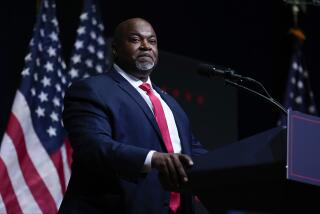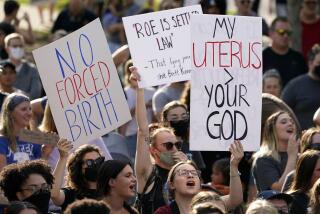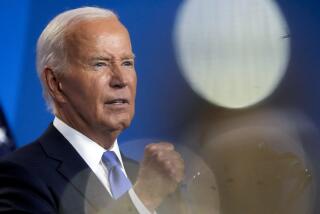Iowa is no big deal -- it’s just the opening game
- Share via
Every four years, the news media treat the Iowa caucuses as if they are a Truly Important Event, right up there with Michael Jackson’s arrest, O.J. Simpson’s trial and Princess Di’s death. Network news anchors fly in and set up shop. Newsmagazines publish cover stories and charts and graphs. Newspapers fell whole forests to provide enough newsprint to record every twitch, twist and turn in the Iowa body politic.
“It doesn’t get much bigger than Iowa tonight,” a CNN announcer intoned Monday, just as the Iowa caucuses were beginning.
Really?
Iowa is a small and by no means representative state in our representative democracy. Its population is fewer than 3 million -- smaller than that of Los Angeles -- in a nation of almost 300 million. The “huge” turnout that so many journalists breathlessly reported in Monday’s caucuses -- 117,000 -- is smaller than the population of Palmdale. Iowa is heavily rural and 94% white in an increasingly urban, multicultural country.
The Iowa caucuses are neither a primary nor a binding commitment. As even the New York Times -- one of the leaders in the caucuses-as-cosmic-event coverage -- acknowledged in a Page 1 story on the morning of this year’s voting, “The contest does not produce a single convention delegate.... It is far from a reliable predictor of the eventual nominee.”
Despite the intense media focus on Iowa and all the talk every four years about the “Iowa bounce” -- the boost a winning candidate in Iowa is supposed to get in the New Hampshire primary, the next stop on the campaign trail -- Iowa isn’t even a reliable predictor of who’ll win in New Hampshire. In nine of the 14 contested primaries there since 1972, the winner in Iowa did not win in New Hampshire.
One could make the same case about over-coverage of New Hampshire -- another first-in-the-nation voting state that’s about as representative of the rest of the country as Watts or Waikiki -- but at least New Hampshire does have a binding primary, and it can be a reliable indicator of future campaign success. In the last 50 years, no candidate who entered the New Hampshire primary and wound up lower than second place won his party’s presidential nomination that year.
Iowa? In the 14 caucuses since 1976, when Jimmy Carter made Iowa’s reputation by coming out of nowhere to “win” (technically, he finished second, behind “uncommitted” delegates), only six of the 11 candidates who won the caucuses in a contested race went on to win their party’s nomination.
*
Heartland appeal
So what’s the big deal about Iowa -- win or lose?
Why all the headlines, from “Time Is Rapidly Running Out to Challenge Front-Runner Dean” and “In Iowa, Most Roads Lead to Dean Campaign Stops” to “Kerry Pulls Off Iowa Upset; Dean Finishes a Distant 3rd”?
Well, one explanation is that the national media -- having missed Carter’s early surge -- don’t want to make the same mistake again. If Iowa “made” Carter’s candidacy, it could make anyone’s -- the media thought for a long time that it would make Howard Dean’s this year -- and the national press wasn’t going to be caught napping again.
Supporters of the caucuses say they give lesser-known, poorly funded candidates a chance to organize and mobilize support. This, they say, is a welcome antidote to the growing dominance of the big-name candidates and their big-spending, well-oiled, consultant-laden campaigns.
In this era of campaign-by-TV-commercial, Iowa is the last bastion of what politicians call “retail” or grass-roots campaigning -- candidates tromping through the state to meet voters face to face. It’s democracy -- real, human, politician-to-people democracy -- in action. And it ends with all those cozy caucuses, with voters talking and debating and horse-trading before making their choices.
“For the press, there’s a kind of romance in the process,” says Mark Whitaker, editor of Newsweek. “It happens in the solid, Midwest heartland, and it’s a throwback to an earlier stage of democracy.”
But in Iowa, as elsewhere, spending on television ads has “absolutely jumped geometrically,” in the words of CNN’s Jeff Greenfield. The four leading Democrats (and independent groups affiliated with their campaigns) spent more than $10 million on TV ads.
Still, campaigning in Iowa is very different from campaigning in, say, New York or California, and it can be “very useful as a crucible in which the candidates do get tested,” says Jim Kelly, managing editor of Time magazine. “Character really shows itself in that pressure-cooker, and it’s important for us [journalists] to see how Dean reacts to being piled on, how [Sen. John] Kerry reacts to victory.”
The media cover Iowa heavily, in part, for the same reason that Sir Edmund Hilary said he climbed Mt. Everest: Because it’s there.
But Iowa isn’t Mt. Everest. In the political topography of a presidential campaign, it’s more like Signal Hill -- small but with a now-totemic name. And it’s acquired that name -- that symbolic significance -- largely because political reporters have become increasingly like sports reporters. They’re less interested in exploring the substantive issues in a campaign than in what’s come to be called “horserace journalism” -- who’s ahead and by how much.
*
Season has long way to go
Baseball is probably a better analogy than horseracing in this regard. Like modern campaigns, the baseball season is long. Sportswriters sit through spring training, eager for the first games of the regular season, and it’s tempting to make more of a team’s performance in those early games than circumstances -- and the grueling season ahead -- really warrant. The same is true when voters caucus in Iowa, and the regular season begins after months of the political equivalent of spring training -- campaigning without voting.
The buildup to Iowa is like the buildup to the World Series. But the World Series comes at the end of the baseball season. The winner is the champion. Iowa is the opening game of the political season.
“It takes me back to growing up as a kid in Cincinnati, going to opening day at Crosley Field,” says Erik Sorenson, president of MSNBC. “There’s a lot of pomp and circumstance, a lot of pageantry. It’s important symbolically, but it’s ultimately much ado about nothing.”
I don’t know about opening day in Cincinnati, but I can still remember that the Dodgers won their opening-day game, 8-0, last year, a day after The Times said, “They believe they’re the best in the National League West and, for the first time in a long time, they might be right.”
The Dodgers finished in the toilet, about where the Iowa favorite, Howard Dean, finished Monday.
That should provide a cautionary note for John Kerry and the national media.
*
David Shaw can be reached at david.shaw@latimes.com. To read his previous “Media Matters” columns, please go to latimes.com/shaw-media.
More to Read
Get the L.A. Times Politics newsletter
Deeply reported insights into legislation, politics and policy from Sacramento, Washington and beyond. In your inbox twice per week.
You may occasionally receive promotional content from the Los Angeles Times.









